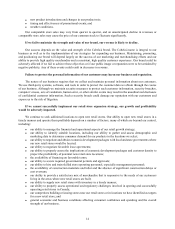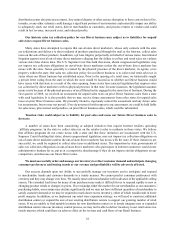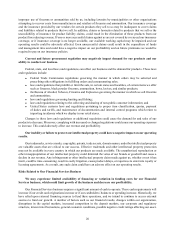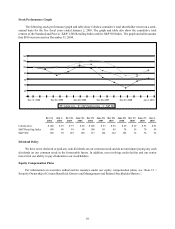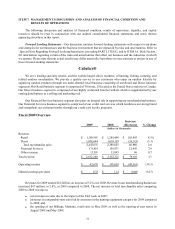Cabela's 2009 Annual Report Download - page 33
Download and view the complete annual report
Please find page 33 of the 2009 Cabela's annual report below. You can navigate through the pages in the report by either clicking on the pages listed below, or by using the keyword search tool below to find specific information within the annual report.24
purchases from us. Adverse changes in the desirability of products we sell, negative trends in retail customer service
and satisfaction, or the termination or modification of the loyalty program could have a negative impact on our bank
subsidiary’s ability to grow its account base and to attract desirable co-branding opportunities with third parties.
Our Financial Services business faces the risk of a complex and changing regulatory and legal
environment.
Our Financial Services business operates in a heavily regulated industry and is therefore subject to a wide array
of banking and consumer lending laws and regulations. Failure to comply with these laws and regulations could
result in financial, structural, and operational penalties being imposed. In addition, as a Visa member bank, our bank
must comply with rules and regulations imposed by Visa. For example, our bank subsidiary and Cabela’s could be
fined by Visa for failing to comply with Visa’s data security standards.
Effective July 1, 2010, the Federal Reserve Board’s amendments to Regulation AA (Unfair or Deceptive Acts or
Practices) and Regulation Z (Truth in Lending) will place new limitations on credit card issuers. This includes new
rules regarding increasing interest rates, allocations of payments, reasonable time to make payments, and changes
to default pricing. In addition, these amendments will increase disclosures to consumers as well as increase notice
periods for changes in terms and interest rates. The amendments will restrict our ability to manage credit risk and
interest rate risk which may negatively affect earnings. We are evaluating these amendments and looking for ways to
mitigate their potential impact and reduce any material adverse effects to earnings.
The Credit Card Accountability Responsibility and Disclosure Act of 2009 and related regulations may
impact the practices of our Financial Services business and could have a material adverse effect on our results
of operations.
The Credit Card Accountability Responsibility and Disclosure Act of 2009 (the “CARD Act”) and related
regulations require our Financial Services business to change some of its current practices. These requirements
will restrict our ability to increase interest rates on existing credit card balances, charge over-limit fees, and charge
fees for making a payment. The CARD Act provisions and related regulations also further define acceptable due
dates, payment allocations, disclosure requirements, and “reasonable” fees and prohibit increasing the interest rates
on variable rate credit card accounts that are subject to a fixed-rate floor. Most of the requirements of the CARD
Act become effective in February 2010, but several provisions became effective on August 20, 2009 and others will
become effective in August 2010. The Federal Reserve has not issued the final rules that will take effect in August
2010 therefore it is difficult to evaluate the effects these provisions will have on our Financial Services business.
The new requirements impose substantive requirements and restrictions on credit card accounts as well as
many new disclosure requirements, some of which require significant adjustments to our Financial Service business’
systems. Our Financial Services business is evaluating the effects of the CARD Act on its existing practices,
cardholder agreements, annual percentage rates, and revenue. The full impact of the CARD Act on our Financial
Services business is unknown at this time. The full impact on consumer behavior and the actions of our competitors
is also unknown. Compliance with the CARD Act provisions could result in reduced interest income and other fee
income. Our bank subsidiary issued a change in terms effective July 2009 to lessen the effects of the CARD Act.
If we are not able to lessen the impact of the changes required by the CARD Act, the changes may have a material
adverse effect on our results of operations.
Proposed financial system reforms could, if adopted as proposed, require us to divest our Financial
Services business, which may materially adversely affect our business and results of operation.
On June 17, 2009, the Obama administration announced a sweeping proposal to reform the U.S. financial
services industry. One of the changes included in this proposal was to eliminate the exemption from the definition
of “bank” under the Bank Holding Company Act of 1954, as amended, (“BHCA”) for credit card banks, such as
our Financial Services business. On December 11, 2009, the U.S. House of Representatives passed “The Wall
Street Reform and Consumer Protection Act of 2009” (the “House Reform Bill”). Under the House Reform Bill, the
exemption from the definition of “bank” under the BHCA for credit card banks was preserved. It is unclear whether


